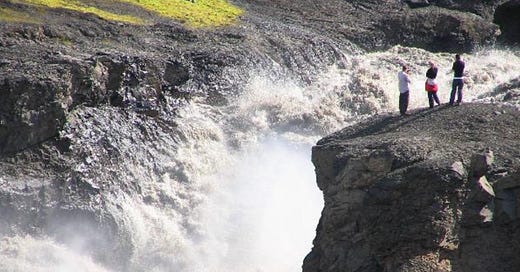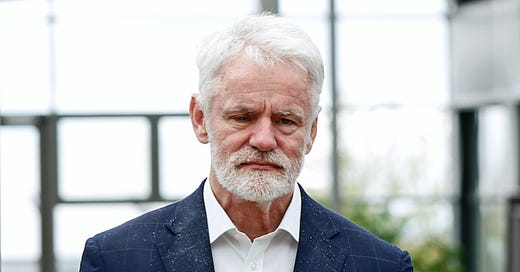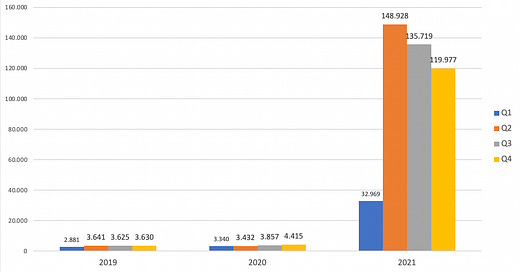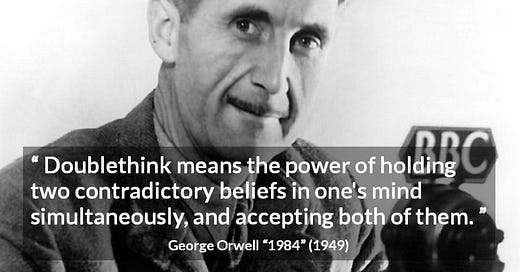

Discover more from From Symptoms to Causes
Revisiting Dreamland
Why do those, who earlier fought to preserve the unique nature of Iceland, now call for its destruction, and the censorship of those who oppose it?
Part of the wilderness in the Kárahnjúkar area in Iceland, now under water
One of the better books I've read is Dreamland - A Self-Help Manual for a Frightened Nation (2006) by renowned Icelandic author Andri Snær Magnason, who recently urged the staff of the main Icelandic newspaper Morgunblaðið to strike, after their editor approvingly quoted a blogger sceptical of global warming. Magnason‘s book was written at a time of strong division between those who wanted to preserve our wilderness and those who wanted to sacrifice it on the altar of temporary job-creation; they feared that government sponsored megaprojects were the only way to drive economic growth. Sparking this battle were plans for the taxpayer funded Kárahnjúkar power plant, to produce electricity for an Alcoa smelter in the east of Iceland.
This book came to mind the other day when I went out into the garden to get some chives from below the living room window and felt something fuzzy on the back of my hand as I was about to grab the straws; I looked down and straight into two curious eyes, or perhaps rather the suspicious eyes of the spider that had settled there, so I backed away and cut my chives elsewhere in the garden. After all, spiders do not deserve to be interrupted in their important work. Then I picked a few tomatoes, which I had never dreamt could be grown outdoors in Iceland, let alone during this unusually cold and rainy summer.
That spider was one of hundreds thriving in our well-sheltered garden on the outskirts of central Reykjavik, along with blackbirds, redwings, honeybees, wasps and other small animals. Their lives are undisturbed; we do not engage much in planning here, apart from the obligatory bi-monthly lawnmowing. Life is simply trusted, and it takes care of itself. Perhaps this is the reason Dreamland came to mind.
When I reviewed this book for a local magazine many years ago I titled my review „Dam Psychology“, because Dreamland is about psychology, it is about fear; the fear of freedom, fear of the unknown and the unexpected, and how it forces us to try to organize the world, to establish some kind of predictability – often with rather unpredictable consequences.
The radical, critical voices may sometimes be annoying, especially if we disagree with them strongly. But they are also important, for sometimes they have valid points to make. This is why I would never approve of censoring any of them, and even if they made no valid points for that matter. For silencing and censorship is never the answer.
During the past 30 months, we have experienced a trend towards silencing and censorship, unprecedented in our time. And this silencing and censorship is rooted in fear; irrational fear, and it is rooted in a mad belief in man's ability to organize and manage nature. In other words, we are dealing with a situation of exactly the same kind as the fear on which the megaproject frenzy was based.
Just like the author of Dreamland I was heavily involved in the fight against the Kárahnjúkar power plant at the time. This was for economic reasons; pouring taxpayer money into a project with a highly negative NPV is never a good idea. Our resistance was not successful, unfortunately. Fear had the upper hand. And now we will probably see the rest of our country's natural gems sacrificed on the altar of the fear of climate change, by damming more or less every stream and filling up the countryside with windmills. But interestingly, driving this now are the same people who twenty years ago fought relentlessly for the preservation of our wilderness; it must now be sacrificed for good in an attempt at controlling the global climate and those who object should be silenced.
Let us contemplate this apparent paradox for a moment.
Now, it may well be that the theory of climate change caused by humans is correct. And it may well be that there is no way to adapt to such changes, although I highly doubt it; a quarter of the Netherlands is below sea-level, land reclaimed from the ocean; humanity has adapted to changes before.
I recall that when the controversy over the Kárahnjúkar megaproject was at its highest, many people wanted to silence critical voices: The science was settled. Concerns about negative environmental and economic consequences were dangerous and should not be heard. Every voice of criticism was met by a synchronized chorus of well funded supporters. I remember this well. And those who doubted were shunned, excluded. Though not by everyone: I often argued about the issue with the then editor in chief of the Morgunblaðið newspaper. But despite our differences he never failed to publish my articles on the matter. He understood the importance of open discussion, just like the current editor does now.
In 1984, Milan Kundera wrote an article in Granta, "A Kidnapped West, or Culture Bows Out". There is one statement in this article that keeps popping up my mind; that modern Western culture is based on „the authority of the thinking, doubting individual“.
I think Kundera is totally correct. And this is why I think, no, I am convinced, and I categorically assert: No matter how wrong, annoying or unnecessary the critical voices may seem to us; silencing and censorship is never the answer. For as soon as we accept it, we refute the basis of our culture, the basis of our human rights, and thereby the right to existence of free democratic society.
















Amen. And isn't it interesting to see how 'environmentalism' no longer means any attempt to preserve our living environment, but rather supporting commercial opportunities to develop new kinds of power systems, whose actual environmental impact we are not permitted to question...?
Wow, I didn't realise the extent to which Icelanders had lost their minds (high mRNA jab rate excepted). Why on earth in a country that is so blessed with geothermal power that it churns hot water into the sea at Nauthólsvík and heats the Laugavegur pavements are they claiming to need wind energy??
I was always under the impression that Icelanders valued their freedoms ("oldest continuous democracy in the world" etc etc) and didn't take kindly to foreign powers colonising or meddling in their country, given the track record of abject poverty that it historically brought. And censorship seems like such a quintessentially unIcelandic, "foreign" concept. A very Chinese concept, in fact.
Did China buy up that chunk of North West Iceland after all – and all of the Icelandic "intellectual class" along with it?? I believe the CCP manufactures a lot of the windmill components it needs foreigners to buy.